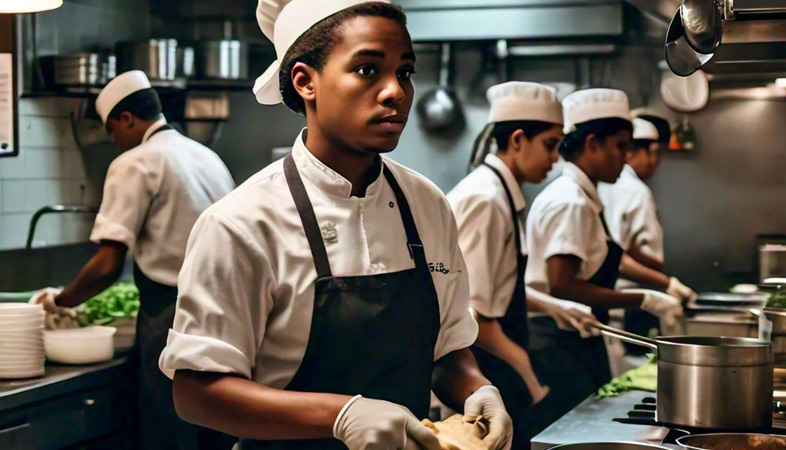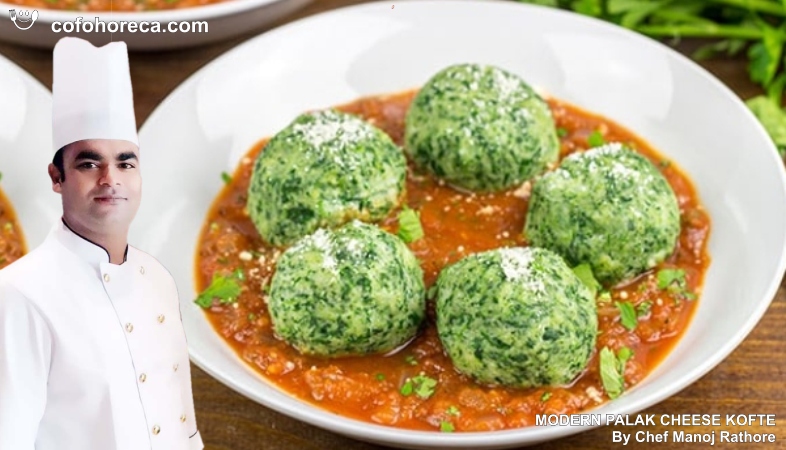Building a Strong Team: Leadership Skills for Kitchen Stewarding Supervisors
Effective leadership skills are essential for kitchen stewarding supervisors to build a cohesive team that works efficiently and harmoniously.
In the bustling environment of a professional kitchen, the
role of a kitchen stewarding supervisor is crucial not only for maintaining
cleanliness and organization but also for fostering a strong, collaborative
team. Effective leadership skills are essential for kitchen stewarding
supervisors to build a cohesive team that works efficiently and harmoniously.
This article explores key leadership skills that can help supervisors enhance
team dynamics and drive success in kitchen operations.
One of the fundamental leadership skills for kitchen stewarding supervisors is effective communication. Clear and open communication helps establish a positive work environment where team members feel valued and understood. Supervisors should encourage regular dialogue, providing opportunities for staff to express concerns, share ideas, and seek clarification on tasks. By promoting transparency and active listening, supervisors can build trust and rapport with their team, creating a more engaged workforce.
Another critical aspect of leadership is the ability to inspire and motivate team members. Kitchen stewarding supervisors should lead by example, demonstrating a strong work ethic and commitment to excellence. Recognizing and celebrating individual and team achievements can significantly boost morale and motivation. Whether through verbal praise, small rewards, or team-building activities, showing appreciation for hard work fosters a sense of belonging and encourages staff to strive for their best.
Delegation is a vital leadership skill that can empower team members and enhance overall efficiency. Kitchen stewarding supervisors should identify the strengths and weaknesses of each team member and delegate tasks accordingly. By entrusting staff with responsibilities, supervisors not only lighten their workload but also provide opportunities for team members to develop their skills and take ownership of their work. Effective delegation fosters a sense of responsibility and accountability, contributing to a more productive and harmonious team dynamic.
Conflict resolution is another essential leadership skill for kitchen stewarding supervisors. In a high-pressure environment, conflicts may arise among team members due to stress or miscommunication. Supervisors should be equipped with the ability to address conflicts promptly and constructively. This involves remaining calm, facilitating open discussions between parties involved, and seeking mutually beneficial solutions. By effectively managing conflicts, supervisors can maintain a positive team atmosphere and prevent issues from escalating.
Building a strong team also requires fostering a culture of continuous learning and development. Kitchen stewarding supervisors should encourage staff to pursue training opportunities, attend workshops, and participate in industry events. Providing access to resources and mentorship can help team members enhance their skills and stay updated on industry best practices. By investing in the growth of their team, supervisors not only improve operational efficiency but also demonstrate a commitment to their employees' professional development.
Furthermore, adaptability is a crucial leadership trait in the ever-evolving culinary landscape. Kitchen stewarding supervisors should be open to change and willing to embrace new technologies, practices, and trends. By modeling a positive attitude towards change, supervisors can help their team navigate transitions smoothly and encourage innovation. This adaptability fosters resilience within the team, allowing them to respond effectively to challenges and capitalize on new opportunities.
Another key leadership skill is the ability to set clear goals and expectations. Kitchen stewarding supervisors should communicate specific, measurable objectives for the team, ensuring that everyone understands their roles and responsibilities. Regularly reviewing progress and providing constructive feedback helps keep the team on track and reinforces accountability. By aligning individual and team goals with the broader objectives of the kitchen, supervisors create a sense of purpose and direction.
Finally, fostering a positive team culture is essential for building a strong team. Kitchen stewarding supervisors should prioritize inclusivity, respect, and collaboration within the team. Encouraging team bonding through social activities, team-building exercises, and celebrating cultural diversity can strengthen relationships and improve teamwork. A positive team culture contributes to employee satisfaction and retention, ultimately leading to better service quality and operational success.
In conclusion, building a strong team as a kitchen stewarding supervisor requires a combination of effective leadership skills, including communication, motivation, delegation, conflict resolution, continuous learning, adaptability, goal-setting, and fostering a positive culture. By embracing these skills, supervisors can create a cohesive team that works together seamlessly to deliver exceptional results in kitchen operations. A strong team not only enhances the overall efficiency of stewarding tasks but also contributes to a positive work environment where every team member feels valued and empowered. As the foodservice industry continues to evolve, the importance of strong leadership in kitchen stewarding cannot be overstated, making it essential for supervisors to invest in their leadership development for the benefit of their teams and the organization as a whole. ### Building a Strong Team: Leadership Skills for Kitchen Stewarding Supervisors
In the bustling environment of a professional kitchen, the role of a kitchen stewarding supervisor is crucial not only for maintaining cleanliness and organization but also for fostering a strong, collaborative team. Effective leadership skills are essential for kitchen stewarding supervisors to build a cohesive team that works efficiently and harmoniously. This article explores key leadership skills that can help supervisors enhance team dynamics and drive success in kitchen operations.
One of the fundamental leadership skills for kitchen stewarding supervisors is effective communication. Clear and open communication helps establish a positive work environment where team members feel valued and understood. Supervisors should encourage regular dialogue, providing opportunities for staff to express concerns, share ideas, and seek clarification on tasks. By promoting transparency and active listening, supervisors can build trust and rapport with their team, creating a more engaged workforce.
Another critical aspect of leadership is the ability to inspire and motivate team members. Kitchen stewarding supervisors should lead by example, demonstrating a strong work ethic and commitment to excellence. Recognizing and celebrating individual and team achievements can significantly boost morale and motivation. Whether through verbal praise, small rewards, or team-building activities, showing appreciation for hard work fosters a sense of belonging and encourages staff to strive for their best.
Delegation is a vital leadership skill that can empower team members and enhance overall efficiency. Kitchen stewarding supervisors should identify the strengths and weaknesses of each team member and delegate tasks accordingly. By entrusting staff with responsibilities, supervisors not only lighten their workload but also provide opportunities for team members to develop their skills and take ownership of their work. Effective delegation fosters a sense of responsibility and accountability, contributing to a more productive and harmonious team dynamic.
Conflict resolution is another essential leadership skill for kitchen stewarding supervisors. In a high-pressure environment, conflicts may arise among team members due to stress or miscommunication. Supervisors should be equipped with the ability to address conflicts promptly and constructively. This involves remaining calm, facilitating open discussions between parties involved, and seeking mutually beneficial solutions. By effectively managing conflicts, supervisors can maintain a positive team atmosphere and prevent issues from escalating.
Building a strong team also requires fostering a culture of continuous learning and development. Kitchen stewarding supervisors should encourage staff to pursue training opportunities, attend workshops, and participate in industry events. Providing access to resources and mentorship can help team members enhance their skills and stay updated on industry best practices. By investing in the growth of their team, supervisors not only improve operational efficiency but also demonstrate a commitment to their employees' professional development.
Furthermore, adaptability is a crucial leadership trait in the ever-evolving culinary landscape. Kitchen stewarding supervisors should be open to change and willing to embrace new technologies, practices, and trends. By modeling a positive attitude towards change, supervisors can help their team navigate transitions smoothly and encourage innovation. This adaptability fosters resilience within the team, allowing them to respond effectively to challenges and capitalize on new opportunities.
Another key leadership skill is the ability to set clear goals and expectations. Kitchen stewarding supervisors should communicate specific, measurable objectives for the team, ensuring that everyone understands their roles and responsibilities. Regularly reviewing progress and providing constructive feedback helps keep the team on track and reinforces accountability. By aligning individual and team goals with the broader objectives of the kitchen, supervisors create a sense of purpose and direction.
Finally, fostering a positive team culture is essential for building a strong team. Kitchen stewarding supervisors should prioritize inclusivity, respect, and collaboration within the team. Encouraging team bonding through social activities, team-building exercises, and celebrating cultural diversity can strengthen relationships and improve teamwork. A positive team culture contributes to employee satisfaction and retention, ultimately leading to better service quality and operational success.
The building a strong team as a kitchen stewarding supervisor requires a combination of effective leadership skills, including communication, motivation, delegation, conflict resolution, continuous learning, adaptability, goal-setting, and fostering a positive culture. By embracing these skills, supervisors can create a cohesive team that works together seamlessly to deliver exceptional results in kitchen operations. A strong team not only enhances the overall efficiency of stewarding tasks but also contributes to a positive work environment where every team member feels valued and empowered. As the foodservice industry continues to evolve, the importance of strong leadership in kitchen stewarding cannot be overstated, making it essential for supervisors to invest in their leadership development for the benefit of their teams and the organization as a whole.
.png)





























